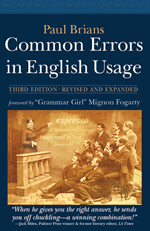cite / site / sight
yanira.vargasYou cite the author in an endnote; you visit a Web site or the site of the crime, and you sight your beloved running toward you in slow motion on the beach (a sight for sore eyes!).
You travel to see the sights. It’s called not “siteseeing” but sightseeing.
BUY THE BOOK!
